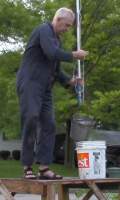- Sanitation systems
- Faecal sludge management (FSM)
- Faecal sludge transport (including emptying of pits and septic tanks, transfer stations)
- Discussion on 'fishing' of rubbish from pit latrines
Discussion on 'fishing' of rubbish from pit latrines
8879 views
Re: Lively discussion on 'fishing' of rubbish from pit latrines at WEDC
Hi all,
Fishing is something that has been on our minds.
Below is a paper that attempts to look at how to deal with trash. I would say that since we submitted this paper, we have formulated a new approach which we described at FSM4 in Chennai. I will discuss that in a later post.
washdev.iwaponline.com/content/7/1/85
Trash removal methods for improved mechanical emptying of pit latrines using a screw auger
Tracey Sisco, Tate Rogers, Walt Beckwith, Willy Chipeta, Rochelle Holm, Christopher A. Buckley, Francis L. de los Reyes
Published March 2017, 7 (1) 85-91; DOI: 10.2166/washdev.2017.106
Abstract
Trash in pit latrines is one of the largest challenges facing pit emptying technologies, including the powered auger (the Excrevator), developed for improved emptying in lower- and lower-middle income countries. This study focused on two trash removal methods in conjunction with pit emptying by the Excrevator: (1) simultaneous removal of trash with sludge and (2) manual trash removal prior to sludge removal. Simultaneous removal was tested by adding to the inlet of the Excrevator system two cutting heads designed to reduce the size of trash particles before entering the pipe and auger. Laboratory testing indicated that the auger will not provide the rotational speeds necessary for proper maceration of fibrous materials such as clothing, indicating that a separate maceration unit with higher rotational methods may be more appropriate. Four manual trash removal mechanisms were designed to improve on existing manual trash ‘fishing’ tools such as iron rods with fixed hooks. Two of these tools (the ‘claw’ and the ‘hook’) showed promising laboratory results and were subsequently field tested in Mzuzu, Malawi. Both tools proved more efficient than the current tools used in the field and have potential for use in Malawi.
washdev.iwaponline.com/content/7/1/85
Fishing is something that has been on our minds.
Below is a paper that attempts to look at how to deal with trash. I would say that since we submitted this paper, we have formulated a new approach which we described at FSM4 in Chennai. I will discuss that in a later post.
washdev.iwaponline.com/content/7/1/85
Trash removal methods for improved mechanical emptying of pit latrines using a screw auger
Tracey Sisco, Tate Rogers, Walt Beckwith, Willy Chipeta, Rochelle Holm, Christopher A. Buckley, Francis L. de los Reyes
Published March 2017, 7 (1) 85-91; DOI: 10.2166/washdev.2017.106
Abstract
Trash in pit latrines is one of the largest challenges facing pit emptying technologies, including the powered auger (the Excrevator), developed for improved emptying in lower- and lower-middle income countries. This study focused on two trash removal methods in conjunction with pit emptying by the Excrevator: (1) simultaneous removal of trash with sludge and (2) manual trash removal prior to sludge removal. Simultaneous removal was tested by adding to the inlet of the Excrevator system two cutting heads designed to reduce the size of trash particles before entering the pipe and auger. Laboratory testing indicated that the auger will not provide the rotational speeds necessary for proper maceration of fibrous materials such as clothing, indicating that a separate maceration unit with higher rotational methods may be more appropriate. Four manual trash removal mechanisms were designed to improve on existing manual trash ‘fishing’ tools such as iron rods with fixed hooks. Two of these tools (the ‘claw’ and the ‘hook’) showed promising laboratory results and were subsequently field tested in Mzuzu, Malawi. Both tools proved more efficient than the current tools used in the field and have potential for use in Malawi.
washdev.iwaponline.com/content/7/1/85
Francis de los Reyes III
Professor/TED Fellow
Professor/TED Fellow
Please Log in to join the conversation.
You need to login to reply- stevensugden
-
 Less
Less- Posts: 32
- Karma: 8
- Likes received: 28
Re: Lively discussion on 'fishing' of rubbish from pit latrines at WEDC
Hi all,
I think fishing is the elephant in the room with regard to the pit emptying process. There are a number of devices in development which can handle varying densities of sludge, but none is capable of managing the solid waste dumped in to pit latrine. Vacuum based devices no doubt have advantages in that they have no valves which can easily block as the waste passed through them.
I went fishing the last time I was in Malawi and it is hot, sweaty, physically demanding work. (We should have a rule that the only people able to attend FSM 4 are those who have fished out at least one latrine - that would help being a focus to the problem) The fishing process used a standard fishing tool and took 1.5 hours. It resulted in around 180 l of solid waste. After it was laborious removed, emptying the remaining 800 liters from the put took around an hour. It was mainly plastic bags, and cloth of varying sizes, and a large school bag. The argument that the pit latrine is important for the disposal of menstrual pads may be true, but the size of some of the cloth pieces and the size of the plastic bags would seem to indicate that this is far from the only source of waste.
[attachment:1]C:\fakepath\IMG_0337.JPG[/attachment]
I think fishing is the elephant in the room with regard to the pit emptying process. There are a number of devices in development which can handle varying densities of sludge, but none is capable of managing the solid waste dumped in to pit latrine. Vacuum based devices no doubt have advantages in that they have no valves which can easily block as the waste passed through them.
I went fishing the last time I was in Malawi and it is hot, sweaty, physically demanding work. (We should have a rule that the only people able to attend FSM 4 are those who have fished out at least one latrine - that would help being a focus to the problem) The fishing process used a standard fishing tool and took 1.5 hours. It resulted in around 180 l of solid waste. After it was laborious removed, emptying the remaining 800 liters from the put took around an hour. It was mainly plastic bags, and cloth of varying sizes, and a large school bag. The argument that the pit latrine is important for the disposal of menstrual pads may be true, but the size of some of the cloth pieces and the size of the plastic bags would seem to indicate that this is far from the only source of waste.
[attachment:1]C:\fakepath\IMG_0337.JPG[/attachment]
Attachments:
-
IMG_0190.JPG (Filesize: 28KB)
Please Log in to join the conversation.
You need to login to reply- dandreatta
-

- I am a mechanical engineer and work for a consulting company. I do projects around water, cookstoves, and sanitation in my spare time.
Less- Posts: 48
- Karma: 4
- Likes received: 17
Re: Lively discussion on 'fishing' of rubbish from pit latrines at WEDC
Hajo, and all,
A preliminary video of the Sludge Digger is at:
The device has been made much more neat and compact since this video, small enough to fit through a 25 cm hole. As soon as I can get my company's video techncian to finish the new video, I will post a much better video. This should be in a week or two. This video will show the Sludge Digger being used in very thick sludge. Based on Jan Spit's statements at the WEDC conference, I believe this is about equal to the sludge he was unable to pump without being fluidized. As you will see, the Sludge Digger also picks up a variety of trash easily, since it is essentially a bucket on a stick.
Dale Andreatta
A preliminary video of the Sludge Digger is at:
The device has been made much more neat and compact since this video, small enough to fit through a 25 cm hole. As soon as I can get my company's video techncian to finish the new video, I will post a much better video. This should be in a week or two. This video will show the Sludge Digger being used in very thick sludge. Based on Jan Spit's statements at the WEDC conference, I believe this is about equal to the sludge he was unable to pump without being fluidized. As you will see, the Sludge Digger also picks up a variety of trash easily, since it is essentially a bucket on a stick.
Dale Andreatta
Dale Andreatta, Ph.D., P.E.
Mechanical Engineer
Mechanical Engineer
Please Log in to join the conversation.
You need to login to reply- hajo
-

- retired in Germany... but still interested in water and sanitation... especially in OSS... and especially in Africa...
Less- Posts: 288
- Karma: 15
- Likes received: 156
Re: Lively discussion on 'fishing' of rubbish from pit latrines at WEDC
hi Dale,
thanks for picking up my post and responding to it.. I am very curious to learn more about your Sludge Digger especially as you emphasise that it works 'without fluidizing, and without fishing out all the trash'. That sounds very interesting because I had learned from eThekwini that sludge which has been fluidized for pumping is too fluid to put it into the LaDePa. And I wonder how big trash can be so that the Sludge Digger can still handle it.
Looking forward to see your next posting,
ciao Hajo
thanks for picking up my post and responding to it.. I am very curious to learn more about your Sludge Digger especially as you emphasise that it works 'without fluidizing, and without fishing out all the trash'. That sounds very interesting because I had learned from eThekwini that sludge which has been fluidized for pumping is too fluid to put it into the LaDePa. And I wonder how big trash can be so that the Sludge Digger can still handle it.
Looking forward to see your next posting,
ciao Hajo
We can't solve problems by using the same kind of thinking we used when we created them.
Albert Einstein
Any intelligent fool can make things bigger and more complex... It takes a touch of a genius - and a lot of courage to move in the opposite direction.
E.F. Schumacher
Everything should be made as simple as possible, but not simpler.
Albert Einstein
Albert Einstein
Any intelligent fool can make things bigger and more complex... It takes a touch of a genius - and a lot of courage to move in the opposite direction.
E.F. Schumacher
Everything should be made as simple as possible, but not simpler.
Albert Einstein
Please Log in to join the conversation.
You need to login to reply- dandreatta
-

- I am a mechanical engineer and work for a consulting company. I do projects around water, cookstoves, and sanitation in my spare time.
Less- Posts: 48
- Karma: 4
- Likes received: 17
Re: Lively discussion on 'fishing' of rubbish from pit latrines at WEDC
Jan, Hajo, and all,
Sorry for the slow response, I always seem to be 2 weeks late on my Susana reading.
I believe Jan is referring to me when he talks about lively discussion and alternative ideas. I had seen most of the content of Jan's presentation previously, on the Susana Forum and through links to the Hanoi conference in January (I attended the WEDC Conference but not the Hanoi Conference). At WEDC I asked a number of questions about how thick is the sludge before and after fluidizing, and the "alternate idea" that I proposed was my Sludge Digger. This is a low-cost alternative to gulpers, vacuum trucks, vacutugs, etc, which is under development and will be shared soon through the Susana network. Based on Jan's description of how thick is the sludge before fluidizing, I believe my Sludge Digger would pick up sludge without fluidizing, and without fishing out all the trash. Watch for a video in the next couple weeks demonstrating the Sludge Digger. The down side to my Sludge Digger is that you need a hole of about 25 cm diameter to access the pit. (A smaller version that goes through the squatting hole is also being worked on.)
I'll also mention that in the following part of the conference Steven Sudgen talked about how fishing trash out of a pit is a terribly filthy process.
Thanks,
Dale Andreatta,
Mechanical Engineer
Sorry for the slow response, I always seem to be 2 weeks late on my Susana reading.
I believe Jan is referring to me when he talks about lively discussion and alternative ideas. I had seen most of the content of Jan's presentation previously, on the Susana Forum and through links to the Hanoi conference in January (I attended the WEDC Conference but not the Hanoi Conference). At WEDC I asked a number of questions about how thick is the sludge before and after fluidizing, and the "alternate idea" that I proposed was my Sludge Digger. This is a low-cost alternative to gulpers, vacuum trucks, vacutugs, etc, which is under development and will be shared soon through the Susana network. Based on Jan's description of how thick is the sludge before fluidizing, I believe my Sludge Digger would pick up sludge without fluidizing, and without fishing out all the trash. Watch for a video in the next couple weeks demonstrating the Sludge Digger. The down side to my Sludge Digger is that you need a hole of about 25 cm diameter to access the pit. (A smaller version that goes through the squatting hole is also being worked on.)
I'll also mention that in the following part of the conference Steven Sudgen talked about how fishing trash out of a pit is a terribly filthy process.
Thanks,
Dale Andreatta,
Mechanical Engineer
Dale Andreatta, Ph.D., P.E.
Mechanical Engineer
Mechanical Engineer
The following user(s) like this post: hajo
Please Log in to join the conversation.
You need to login to reply- hajo
-

- retired in Germany... but still interested in water and sanitation... especially in OSS... and especially in Africa...
Less- Posts: 288
- Karma: 15
- Likes received: 156
Re: Lively discussion on 'fishing' of rubbish from pit latrines at WEDC
dear Jan,
thanks for your interesting reporting on different motorised pit emptying equipment through the Briefing Paper presented at WEDC.
But I do not quite understand that 'the audience insisted to add other solutions to the actual fishing'? If during your trials you had come across other 'fishing methods' than using long hooks, you would surely have reported on it, or?
I would expect that 'a lively discussion' on fishing can create some alternative ideas. Or do I misunderstand the meaning of your last sentence? Please elaborate on that.
And I will come back to you regarding the ROM which I consider a useful tool for pit emptying.
ciao Hajo
thanks for your interesting reporting on different motorised pit emptying equipment through the Briefing Paper presented at WEDC.
But I do not quite understand that 'the audience insisted to add other solutions to the actual fishing'? If during your trials you had come across other 'fishing methods' than using long hooks, you would surely have reported on it, or?
I would expect that 'a lively discussion' on fishing can create some alternative ideas. Or do I misunderstand the meaning of your last sentence? Please elaborate on that.
And I will come back to you regarding the ROM which I consider a useful tool for pit emptying.
ciao Hajo
We can't solve problems by using the same kind of thinking we used when we created them.
Albert Einstein
Any intelligent fool can make things bigger and more complex... It takes a touch of a genius - and a lot of courage to move in the opposite direction.
E.F. Schumacher
Everything should be made as simple as possible, but not simpler.
Albert Einstein
Albert Einstein
Any intelligent fool can make things bigger and more complex... It takes a touch of a genius - and a lot of courage to move in the opposite direction.
E.F. Schumacher
Everything should be made as simple as possible, but not simpler.
Albert Einstein
Please Log in to join the conversation.
You need to login to replyLively discussion on 'fishing' of rubbish from pit latrines at WEDC
On July, 29th we briefed the audience at WEDC on the progress of the pit emptying devices tested by WASTE, IFRC, Malawian Red Cross, and Netherlands Red Cross. While the actual removal of sludge is done in a 'split second' and the fluidisation can be achieved in a good way, the 'fishing' of rubbish remains a challenge. The audience at WEDC insisted to add other solutions to the actual fishing.
This message has attachments files.
Please log in or register to see it.
The following user(s) like this post: yendyo
Please Log in to join the conversation.
You need to login to reply
Share this thread:
- Sanitation systems
- Faecal sludge management (FSM)
- Faecal sludge transport (including emptying of pits and septic tanks, transfer stations)
- Discussion on 'fishing' of rubbish from pit latrines
Recently active users. Who else has been active?
Time to create page: 0.317 seconds







